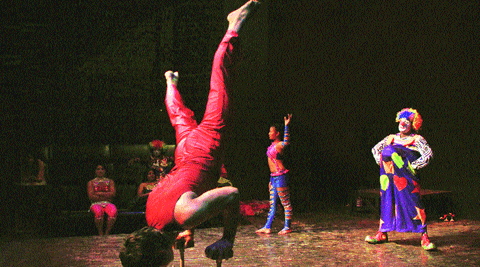Click here to follow Screen Digital on YouTube and stay updated with the latest from the world of cinema.
Stage as the ring
On World Circus Day, a circus group performed at Mumbai’s Prithvi Theatre, stressing on the need to reinvent new spaces and audiences
 Members of Rambo Circus in action
Members of Rambo Circus in action
The stage of the Prithvi Theatre in Mumbai played host to a different kind of dramatics, last week. Covered in a red carpet, it had circus props strewn around. As a young man in a shiny suit balanced on two thin rods, five clowns with bright-hued hair, matching suits and large boots mock at him. A girl rope-walked with ease above the monocycles, large golden hoops and colourful trapeze strings that occupied the stage.
Amid this flurry of activities, an artiste spinned inside a huge black ring, limbs outstretched. Once or twice when he came too close to the seating area, he received a warning from Sujit Dilip, the proprietor of the Rambo Circus. “You’re not on a big ground anymore. Keep an eye on the stage line, or you’ll knock the people in the first row off,” Dilip warned.
“These are ace performers who have toured the country, but have hardly ever been on a stage,” said Dilip with his eyes still on the clowns practising their acrobat act. As they jump off from one formation to the next, he tells them to hold the pose for one beat longer, and look at the audience with a smile. “In a circus tent, the stage is in the centre while at the theatre the audience is seated in the front. Our performances had to be altered. Our acts now face the audience, and music, dance and some dialogues are added. It’s like a regular theatre show,” he adds.
Dilip was in Mumbai with his 25-member team for the World Circus Day celebrations held at Prithvi Theatre. They had shows till April 20 and presented more than 15 traditional circus acts. Bringing the circus to a theatre setting was a conscious decision. Dilip remembers the time when he was 18 years old and had just joined the circus that was then run by his father. He says, “Those were the grand days, where every act would begin with lions roaring and elephants trumpeting.” But, circuses had to surrender their animals following a ban. “After the animals went, many productions lost their business,” he adds.
A member of the World Circus Federation, Dilip travelled to other countries and learnt about the skills circus artistes develop. “There circus performers are professionals, and they performed in theatres. That is why I decided to hold performances not only in tents, but also in unconventional spaces,” he says. The troupe performed on open trailer driving through Pune last year. “I wish we can get that sort of permission in Mumbai,” he says, adding, “If we don’t keep innovating, we’ll be among the many other circuses who have not been able to maintain their former glory.” Dilip’s team of 160 goes through rigorous practise everyday. He brings trainers from across the country and even abroad to train performers and clowns. This year they got their first international student from Mauritius to train with the 22-year-old travelling circus.
“When a circus is announced in a town, a section of the audience is interested. Children with their parents still come in good numbers. But we want to go beyond that and create a sustainable place for the circus,” he says. l
- 01
- 02
- 03
- 04
- 05


































